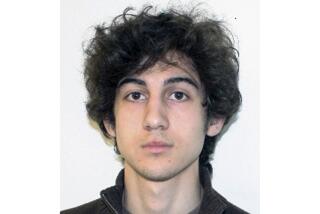Boston Marathon bomber’s relatives recall a ‘smiling, loving child’
- Share via
Reporting from Boston — Five distraught Russian relatives of Dzhokhar Tsarnaev took the witness stand Monday, hoping their words of support and love for the convicted Boston Marathon bomber, translated into English for a Boston jury, would help spare him from the death penalty.
The women — all of them nervous, some crying and one so overcome she had to be excused — sat a few feet in front of the 21-year-old Tsarnaev.
Thirteen years had gone by since the women — cousins and aunts of Tsarnaev — had last set eyes on the defendant. They remembered him as a “smiling, loving child” in the Russian republic of Dagestan and a shy 8-year-old when he and his parents immigrated to the United States. Now they saw him as a bearded, convicted terrorist flanked by U.S. marshals in a crowded courtroom.
Tsarnaev was found guilty last month and soon will be sentenced to death or life in prison with no parole.
When one aunt in her mid-60s became so overcome that she had to be led out of the courtroom, Tsarnaev wiped his right eye, the first emotion he has shown in the two-month trial.
When a cousin in her mid-40s left the courtroom after an hour on the stand, he blew her a silent kiss before he was led off to a holding cell.
“I came for the sake of my brother, whom I love very much,” said a cousin, Raisat Suleimanov, an intensive-care nurse in Dagestan.
Chief prosecutor William D. Weinreb questioned Suleimanov about her support for Tsarnaev, who has often appeared bored, aloof and uninterested during the trial. Weinreb told her that Tsarnaev was “indifferent to the pain and suffering of hundreds” hurt at the marathon.
The nurse said that although she supported her cousin, she condemned the bombing. “I categorically reject what he did. It’s a great tragedy, of course,” she said.
Several other women also expressed their disapproval of the April 2013 bombings that killed three people and injured more than 260 others.
Naida Suleimanov, a gas station cashier, looked at the defendant and said, “Dzhokhar is my brother, my beloved brother.”
She recalled a 2012 visit to Dagestan by his older brother, Tamerlan Tsarnaev, whom defense attorneys say was the bombing mastermind and drew Dzhokhar into the terrorist plot. She said she regretted not trying harder to steer Tamerlan away from his growing religious radicalism.
“I’m sorry that I didn’t have my heart completely open,” she told the jury. “I didn’t demonstrate all my feelings.”
Tamerlan was killed during a shootout with police several days after the bombings.
Naida Suleimanov was shown an old photo of Dzhokhar sitting atop Tamerlan’s shoulders, when the siblings were much younger. She said the two brothers were always very close. “This is the custom,” she said. “You always listen to your older sibling, your older brother, and follow his example.”
The women came here a week ago, escorted by U.S. federal agents in a special arrangement to permit them to testify for the defense. In the courtroom, they presented a picture of Tsarnaev starkly different from what has been seen over the last two months. The most emotional testimony has come from victims and relatives of the dead, with their stories of grief and suffering.
On Monday, the jury heard testimony about the Tsarnaev family unraveling, including Dzhokhar Tsarnaev’s divorced, dysfunctional parents and his childhood in a country ripped apart by decades of war and terrorism. There were pictures of old farmhouses and rugged mountain terrain near the Caspian Sea. There was a snapshot of Tsarnaev’s grandfather, a shepherd, and stories of how Tsarnaev’s grandmother suffered for years from breast cancer. There were many family group photos.
Another aunt, Shakharuzat Suleimanov, born in 1955, said Tsarnaev’s mother was lively and fun, a fashionable dresser. His father, she said, was a hardworking mechanic. When they left the region for the U.S. to build a new life for their young family, she said, the Dagestan relatives were heartbroken.
“It was very painful when they went,” she said. “It’s very hard when your relatives live far away. We cried a lot.”
Twitter: @RickSerranoLAT
More to Read
Sign up for Essential California
The most important California stories and recommendations in your inbox every morning.
You may occasionally receive promotional content from the Los Angeles Times.











